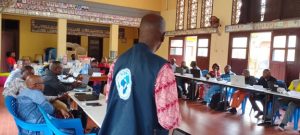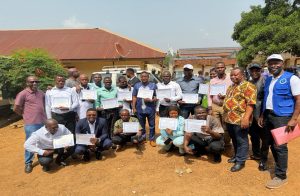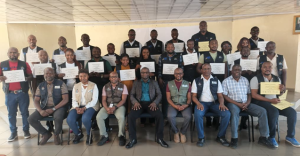AFENET Initiates In-service Field Epidemiology Training in The Horn of Africa
-
by
AFENET
In order to support workforce development and build stronger and resilient public health systems capable of addressing public health threats in the Horn of Africa, the African Field Epidemiology Network (AFENET) embarked on an ambitious program to establish frontline field epidemiology training programs (FETPs) in Somalia, Djibouti, Eritrea, and South Sudan.
Establishing FETPs in these countries was a result of productive collaboration between several partners including US CDC, ministries of health (MoH) of the respective governments, Intergovernmental Authority on Development (IGAD), WHO, AFENET and other development partners in the region. The main objective of this initiative is to build skills and competencies of national and subnational public health workforce to detect, investigate and respond to epidemics and other public health threats in their countries and the region.
In Somalia, AFENET collaborated with the US CDC to support the Federal Ministry of Health (MoH) Somalia, and with IGAD in Djibouti to initiate discussions on initiating an FETP in each country to support the response to the COVID -19 pandemic and in the long term, build stronger and resilient public health systems capable of addressing other public health threats in the countries. Within the framework of this collaboration, a frontline FETP was established. Cohort I was launched on 29 August 2021 with a total of 26 participants drawn national level (14), the states (10) and the WHO country office (2). Experienced trainers and mentors were recruited and fully oriented to effectively facilitate the training.
The Djibouti FETP was launched in 2021, and has since seen 22 persons successfully graduate from the Program.

In South Sudan, twenty-one trainees graduated from the South Sudan frontline FETP in March 2022. Cohort I of the Program comprised 21 surveillance officers drawn from county (7), administrative area (2), state (10), and national (2 ) levels. While officiating at the launch in Juba, Dr. Victoria Aniip Majur – Under Secretary in the Ministry of Health thanked AFENET and CDC for partnering with the MoH to establish the South Sudan FETP and said that graduating the first cohort was a milestone worth cerebrating.

In spite of the challenging working environment characterized by poor internet connectivity, inadequate funding, poor transport infrastructure, insecurity and lack of effective laboratory capacity for timely confirmation, the value that the trainees bring to the public systems in their countries was well captured by Dr. John Rumunu – Director General Preventive Health services and Program Director, South Sudan FETP when he said:
“They used to wait to be told that there is a disease outbreak in their states but now they are able to investigate diseases and other PHEIC and report to higher authorities asking for support to respond to them.”
Dr. Sudhir Bunga – South Sudan CDC Country Director recognized the frontline graduates as “boots on the ground” that will go a long way to help detect and respond to diseases in their communities.
The numbers trained so far are not adequate to meet the health workforce needs for the individual countries and the region as a whole. However, all important accomplishments begin with the decision to start, and what has been achieved so far is a critical first step in the right direction. The successful launch of the training programs in the region is testimony to AFENET’s principle of building effective and sustainable partnerships amongst development partners.



